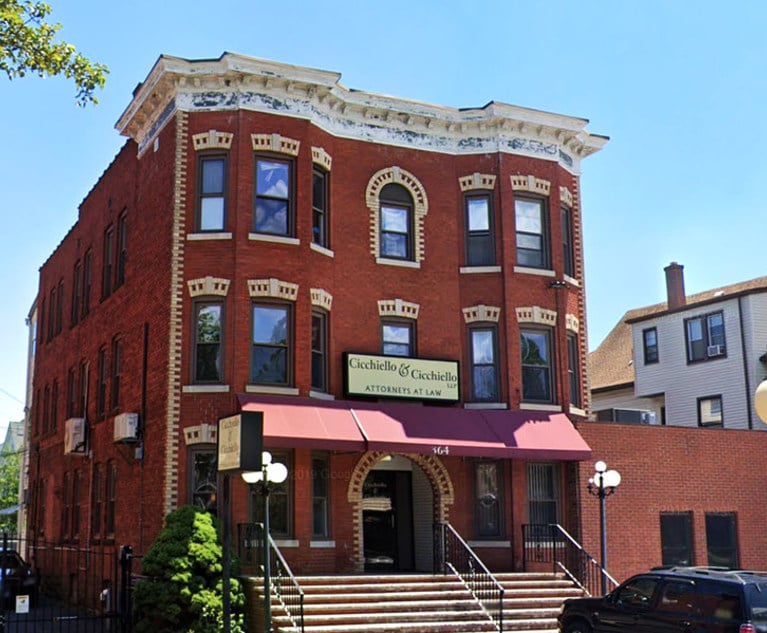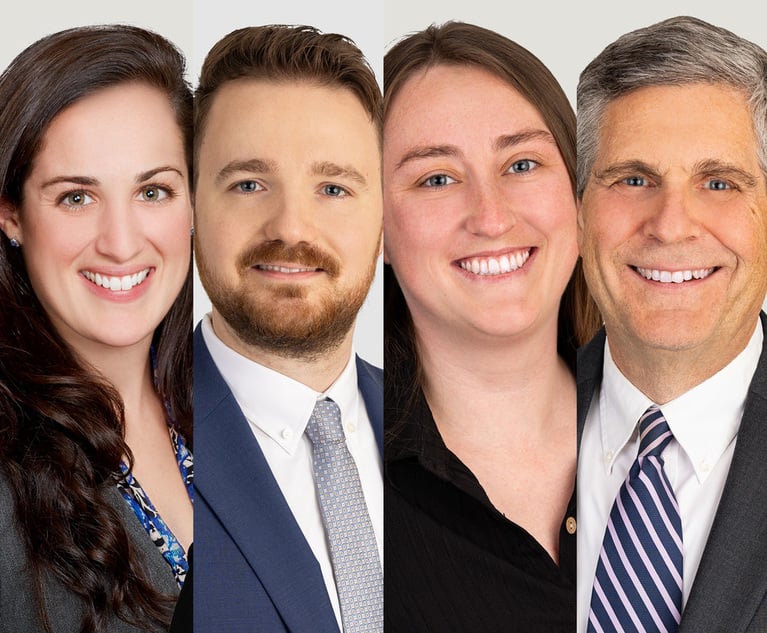 Michael Skakel and Martha Moxley.
Michael Skakel and Martha Moxley.SCOTUS Allows Skakel Reversal to Stand
Michael Skakel is a nephew of Robert F. Kennedy's widow, Ethel Kennedy. He spent 11 years in prison after being charged in 2000 and convicted in 2002 for beating 15-year-old Martha Moxley to death with a golf club. The state has not announced its intentions regarding a possible retrial.
January 07, 2019 at 12:18 PM
2 minute read
The U.S. Supreme Court has denied certiorari in Connecticut v. Skakel, leaving in place a state Supreme Court decision that vacated Kennedy cousin Michael Skakel's conviction in the 1975 murder of Martha Moxley.
Represented by Bridgeport attorney Michael Fitzpatrick, Michael Skakel successfully argued in May that he was denied a fair trial, after being charged in 2000 and convicted in 2002 for beating 15-year-old Moxley to death with a golf club. Skakel, who was also 15 at the time of the murder, was Moxley's neighbor in the Belle Haven section of Greenwich.
Skakel spent 11 years in prison for the murder but was freed in October 2013. The state Supreme Court reinstated his conviction in 2016, but last May the court ruled 4-3 that Skakel's first attorney, Mickey Sherman, had failed to present evidence that would have exonerated Skakel, including testimony from witness Dennis Ossorio.
The state has not announced its intentions regarding a possible retrial of Skakel, who is a nephew of Robert F. Kennedy's widow, Ethel Kennedy. Monday's decision allows to stand a May 4 Connecticut high court decision to throw out Skakel's conviction based on inadequate representation.
Connecticut prosecutors announced shortly after the state Supreme Court's decision to vacate in May that they would appeal to the highest court in the nation. In a May 29 motion, Senior Assistant State Attorney James Killen asked the Connecticut high court to delay executing its judgment while prosecutors petition the U.S. Supreme Court to hear the case.
“Because this court's decision is grounded exclusively on federal constitutional law, the United States Supreme Court should have the opportunity to address this case and the issues it raises,” Killen wrote.
The motion asked the court to determine whether Connecticut's Supreme Count was wrong in finding Skakel's legal representation “to be constitutionally inadequate,” and made a mistake in not weighing the evidence “in a manner consistent with the jury's guilty verdict.”
Prosecutors missed a 20-day window to file the motion following the Connecticut Supreme Court ruling May 4, relying on an exception that extends the deadline under ”the most extraordinary circumstances.”
This content has been archived. It is available through our partners, LexisNexis® and Bloomberg Law.
To view this content, please continue to their sites.
Not a Lexis Subscriber?
Subscribe Now
Not a Bloomberg Law Subscriber?
Subscribe Now
NOT FOR REPRINT
© 2024 ALM Global, LLC, All Rights Reserved. Request academic re-use from www.copyright.com. All other uses, submit a request to [email protected]. For more information visit Asset & Logo Licensing.
You Might Like
View All
Managing Partner Vindicated in Disciplinary Proceeding Brought by Former Associate
5 minute read
Connecticut Movers: Year-End Promotions, Hires and an Office Opening
5 minute read
GC Pleads Guilty to Embezzling $7.4 Million From 3 Banks

Trending Stories
- 1Former McCarter & English Associate Fired Over 'Gangsta Rap' LinkedIn Post Sues Over Discrimination, Retaliation
- 2First-of-Its-Kind Parkinson’s Patch at Center of Fight Over FDA Approval of Generic Version
- 3The end of the 'Rust' criminal case against Alec Baldwin may unlock a civil lawsuit
- 4Solana Labs Co-Founder Allegedly Pocketed Ex-Wife’s ‘Millions of Dollars’ of Crypto Gains
- 5What We Heard From Litigation Leaders This Year
Who Got The Work
Michael G. Bongiorno, Andrew Scott Dulberg and Elizabeth E. Driscoll from Wilmer Cutler Pickering Hale and Dorr have stepped in to represent Symbotic Inc., an A.I.-enabled technology platform that focuses on increasing supply chain efficiency, and other defendants in a pending shareholder derivative lawsuit. The case, filed Oct. 2 in Massachusetts District Court by the Brown Law Firm on behalf of Stephen Austen, accuses certain officers and directors of misleading investors in regard to Symbotic's potential for margin growth by failing to disclose that the company was not equipped to timely deploy its systems or manage expenses through project delays. The case, assigned to U.S. District Judge Nathaniel M. Gorton, is 1:24-cv-12522, Austen v. Cohen et al.
Who Got The Work
Edmund Polubinski and Marie Killmond of Davis Polk & Wardwell have entered appearances for data platform software development company MongoDB and other defendants in a pending shareholder derivative lawsuit. The action, filed Oct. 7 in New York Southern District Court by the Brown Law Firm, accuses the company's directors and/or officers of falsely expressing confidence in the company’s restructuring of its sales incentive plan and downplaying the severity of decreases in its upfront commitments. The case is 1:24-cv-07594, Roy v. Ittycheria et al.
Who Got The Work
Amy O. Bruchs and Kurt F. Ellison of Michael Best & Friedrich have entered appearances for Epic Systems Corp. in a pending employment discrimination lawsuit. The suit was filed Sept. 7 in Wisconsin Western District Court by Levine Eisberner LLC and Siri & Glimstad on behalf of a project manager who claims that he was wrongfully terminated after applying for a religious exemption to the defendant's COVID-19 vaccine mandate. The case, assigned to U.S. Magistrate Judge Anita Marie Boor, is 3:24-cv-00630, Secker, Nathan v. Epic Systems Corporation.
Who Got The Work
David X. Sullivan, Thomas J. Finn and Gregory A. Hall from McCarter & English have entered appearances for Sunrun Installation Services in a pending civil rights lawsuit. The complaint was filed Sept. 4 in Connecticut District Court by attorney Robert M. Berke on behalf of former employee George Edward Steins, who was arrested and charged with employing an unregistered home improvement salesperson. The complaint alleges that had Sunrun informed the Connecticut Department of Consumer Protection that the plaintiff's employment had ended in 2017 and that he no longer held Sunrun's home improvement contractor license, he would not have been hit with charges, which were dismissed in May 2024. The case, assigned to U.S. District Judge Jeffrey A. Meyer, is 3:24-cv-01423, Steins v. Sunrun, Inc. et al.
Who Got The Work
Greenberg Traurig shareholder Joshua L. Raskin has entered an appearance for boohoo.com UK Ltd. in a pending patent infringement lawsuit. The suit, filed Sept. 3 in Texas Eastern District Court by Rozier Hardt McDonough on behalf of Alto Dynamics, asserts five patents related to an online shopping platform. The case, assigned to U.S. District Judge Rodney Gilstrap, is 2:24-cv-00719, Alto Dynamics, LLC v. boohoo.com UK Limited.
Featured Firms
Law Offices of Gary Martin Hays & Associates, P.C.
(470) 294-1674
Law Offices of Mark E. Salomone
(857) 444-6468
Smith & Hassler
(713) 739-1250










